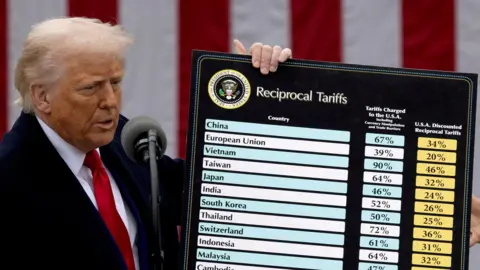US Supreme Court Poised for Landmark Ruling on Trump's Tariffs
The US Supreme Court is set to hear a significant case that could alter the trajectory of Donald Trump’s controversial tariff policies. This legal battle involves small businesses and states who argue that the extensive tariffs imposed by the Trump administration are illegal.
If the justices side with the challengers, it could dismantle key aspects of Trump's trade strategy, leading to potential refunds of billions collected from tariffs deemed unconstitutional, as these taxes on imports would need to be rectified.
The impending ruling will emerge after the court deliberates over legal arguments and discussions that may extend for months. The stakes are high; Trump has indicated that losing this case could severely impair his ability to conduct trade negotiations, terming it a threat to national security.

"I wanted to go so badly... It's not about me, it's about our country," Trump remarked, deciding against attending the hearing to avoid distraction.
The ramifications of this court ruling could reverberate throughout various sectors. Learning Resources, a toy company engaged in the lawsuit, reports a staggering $14 million impact from the tariffs this year alone. CEO Rick Woldenberg expressed that the situation has thrown their business into “unbelievable disruption.”
A Test to Trump's Presidential Power
This case could delve deeper into defining presidential powers as it relates to trade regulation. Legal analysts predict that a decision favoring Trump might empower future administrations while one against him could set substantial limitations. The tariffs in question were levied under the International Emergency Economic Powers Act, a mechanism introduced in 1977 allowing the president to act without the slower processes of Congress.
Critics argue that while the law permits regulation of trade, it does not specifically authorize tariffs, which under the US Constitution, are Congress's prerogative. Efforts have been made by bipartisan members of Congress to challenge the legality of these tariffs, with over 200 lawmakers expressing their concerns in filings to the Supreme Court.
What's Next?
As anticipation for the court's decision builds, businesses remain uncertain. Trump's officials have suggested they would seek alternative means for tariffs should they lose the case, utilizing different legal frameworks that entail more procedural steps. However, analysts argue that the rapid implementation of current tariffs without sufficient warning has created chaos in the marketplace.
Notably, the upcoming Supreme Court ruling doesn't just affect domestic industries; it could also hinder international trade relations, such as the current deal negotiations with the European Union.
As the court prepares to delve into these contentious issues, both proponents and opponents of the tariffs await with bated breath, recognizing that this decision will likely have lasting impacts on the fabric of US trade policies and the extent of executive power moving forward.






















